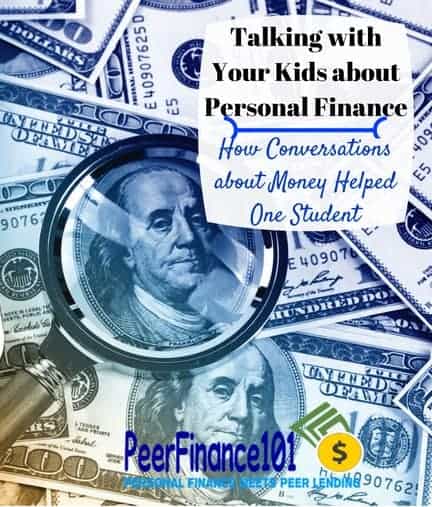Conversations with his parents about personal finance helped one student manage his money
We talk to our kids about drugs, sex and just about everything else within their personal lives but we seldom talk about personal finance. It’s too bad because it isn’t a topic taught in school and too many young people are plagued by early financial mistakes.
Today’s essay is by Michael Klein, a student at the University of Arizona. He shares how early conversations about money and personal finance with his parents helped him throughout his life.
Check out Michael’s story and please share on social media. The most-shared essay on how parents can teach their kids about money will win our $500 personal finance scholarship, announced August 31st!
Looking for more financial conversations to have with your kids? Check out these eight stock market basics to get them ready to start investing!
Talking Finances with my Parents
Talking finances with my parents was a pretty easygoing topic of discussion. I started a savings account when I was about 12 years old because I learned that putting money into a savings account earned you interest.
I thought to myself, “Hey if I put my already earned money in a savings account, I can earn interest and gain more money for no work!” Of course this was my 12-year old brain telling me that you don’t have to work to earn money, however this is not true. Although you do indeed earn money through interest in a savings account, you can’t live off of what is earned.
So in comes my parents; they introduced to me this term I had never heard before because I had never earned money on my own, aside from running a lemonade stand once when I was eight. The term was: personal finances.
Learning about Personal Finance
Learning about personal finance, although new to me, wasn’t hard to understand because of the education both my parents had received. My mother graduated from Stephen’s College with a business, and later received her CPA license. My father went to Indiana University where he received a Bachelor’s in telecommunications and finally to Houston Community College where he earned a degree in Accounting.
There is no shortage of ability in my family when it comes to the best ways to talk about how to handle personal finance. So when approached by my parents as to what I was doing about my personal finances, I asked “What do you mean?” They responded with. “How do you plan on making money and paying bills?” I said I’d find work, of course; their response was obviously “it’s not that easy!”
Millennials are discovering that making money doesn’t necessarily mean the traditional 9-to-5 rat race. Check out these five strategies to make money from home in this work from home directory.

They taught me that I should hold on to any receipts that are given to me so that when I go home to check my bank balance all the amounts that are subtracted are correct and no false charges were added. If my bank account is the same all I’d need to do is make sure to put a small fortune into my savings account where it could be held for future needs, slowly growing with interest.
As I grew older I realized that I would need a job to support myself. Through careful budgeting, I would intentionally take a small amount out from my paycheck and put it into my savings account. Each time I added more money to the savings account my money would be earning compound interest, so I would be earning interest on interest.
Looking to grow your compound interest in savings? Discover Online offers an interest rate up to five-times the national average.
So if I keep at the current pace, and keep adding a portion of my paychecks into my savings account I can incur what is known as the Snowballing Affect. This means that as more and more money is added into the savings account the bigger the “Snowball” gets, meaning I’d have more money saved up!
I want to thank Michael for his essay on his money conversations with his parents and how they talked about personal finance. Be sure to support Michael by sharing the article through social media and check in August for the winner of the personal finance scholarship.
